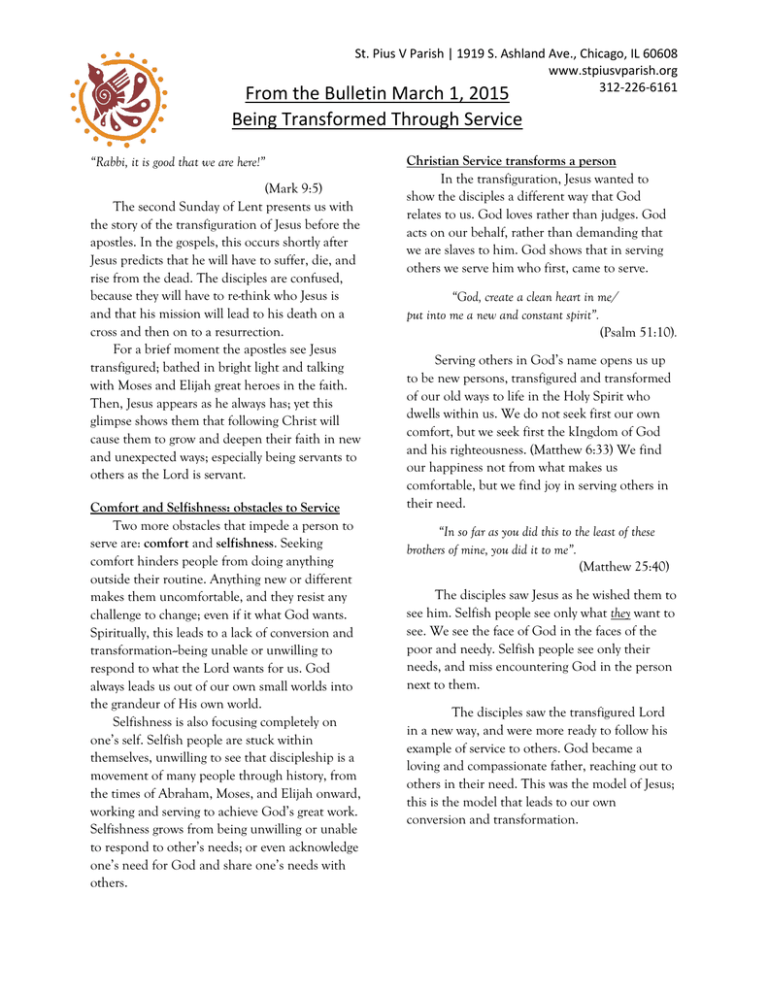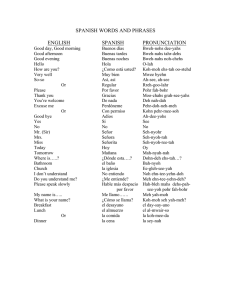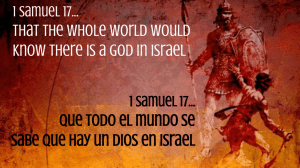From the Bulletin March 1, 2015 Being
Anuncio

St. Pius V Parish | 1919 S. Ashland Ave., Chicago, IL 60608 www.stpiusvparish.org 312-226-6161 From the Bulletin March 1, 2015 Being Transformed Through Service “Rabbi, it is good that weseow are here!”Service can Transfigure People ChristianHis Service transforms a person (Mark 9:5) The second Sunday of Lent presents us with the story of the transfiguration of Jesus before the apostles. In the gospels, this occurs shortly after Jesus predicts that he will have to suffer, die, and rise from the dead. The disciples are confused, because they will have to re-think who Jesus is and that his mission will lead to his death on a cross and then on to a resurrection. For a brief moment the apostles see Jesus transfigured; bathed in bright light and talking with Moses and Elijah great heroes in the faith. Then, Jesus appears as he always has; yet this glimpse shows them that following Christ will cause them to grow and deepen their faith in new and unexpected ways; especially being servants to others as the Lord is servant. Comfort and Selfishness: obstacles to Service Two more obstacles that impede a person to serve are: comfort and selfishness. Seeking comfort hinders people from doing anything outside their routine. Anything new or different makes them uncomfortable, and they resist any challenge to change; even if it what God wants. Spiritually, this leads to a lack of conversion and transformation--being unable or unwilling to respond to what the Lord wants for us. God always leads us out of our own small worlds into the grandeur of His own world. Selfishness is also focusing completely on one’s self. Selfish people are stuck within themselves, unwilling to see that discipleship is a movement of many people through history, from the times of Abraham, Moses, and Elijah onward, working and serving to achieve God’s great work. Selfishness grows from being unwilling or unable to respond to other’s needs; or even acknowledge one’s need for God and share one’s needs with others. In the transfiguration, Jesus wanted to show the disciples a different way that God relates to us. God loves rather than judges. God acts on our behalf, rather than demanding that we are slaves to him. God shows that in serving others we serve him who first, came to serve. “God, create a clean heart in me/ put into me a new and constant spirit”. (Psalm 51:10). Serving others in God’s name opens us up to be new persons, transfigured and transformed of our old ways to life in the Holy Spirit who dwells within us. We do not seek first our own comfort, but we seek first the kIngdom of God and his righteousness. (Matthew 6:33) We find our happiness not from what makes us comfortable, but we find joy in serving others in their need. “In so far as you did this to the least of these brothers of mine, you did it to me”. (Matthew 25:40) The disciples saw Jesus as he wished them to see him. Selfish people see only what they want to see. We see the face of God in the faces of the poor and needy. Selfish people see only their needs, and miss encountering God in the person next to them. The disciples saw the transfigured Lord in a new way, and were more ready to follow his example of service to others. God became a loving and compassionate father, reaching out to others in their need. This was the model of Jesus; this is the model that leads to our own conversion and transformation. St. Pius V Parish | 1919 S. Ashland Ave., Chicago, IL 60608 www.stpiusvparish.org 312-226-6161 Del Boletín de 1 Marzo 2015 Transformados por el Servicio “¡Rabbí, que bueno que estamos aquí!” —Marcos 9,5 El segundo domingo de cuaresma nos presenta con la historia de la transfiguración de Jesús delante de los apóstoles. Esto ocurre un poco después el momento cuando Jesús pronostica que tiene que sufrir, morir, y se resucita. Ellos están confundidos, porque tienen que pensar de nueva manera la identidad de Jesús y que su misión lo llevaría a su muerte y resurrección. Por un momento breve, los apóstoles vean a Jesús transfigurado, en luz brillante y hablando con Moisés y Elías, dos héroes históricos en la fe. De repente, Jesús aparece normal; pero su mirada se lo mostró que siguiendo a Cristo se provocará en ellos un crecimiento y cambio de su fe en maneras nuevas y no anticipadas; especialmente en ser servidores como Cristo es siervo. Ccomodidad y egosimo: obstáculos al Servicio Dos obstáculos más al servicio son: la comodidad y el egoísmo. Buscando su própio comodidad sobre todo impide a la persona salir de su rutina. Algo nuevo o distinto hacen ellos incómodos, y resisten la tendencia cambiarse, aún Dios lo quiere. Espiritualmente, provoca una falta de conversión y transformación—noqueriendo o incapaz en responder al la voluntad del Señor. Dios quiere guiarnos de nuestros mundos pequeños a la grandeza de su mundo. Egoísmo también enfoca solamente en la persona misma. Los egoístas están estancados en ellos mismos, incapaces ver que el discipulado es un movimiento de mucha gente por la historia, desde Abram, Moisés, y Elías en adelante, sirviendo la realización del plan de Dios. El egoísmo crece de ser no disponible o incapaz en el responder a las necesidades de otros; o quizás no reconocer que uno mismo tiene necesidad de Dios. Servicio cristiano transforma a la persona En la transfiguración, Jesús querría mostrar a sus discípulos una nueva manera que Dios se relacione nosotros. Dios ama no juzga; Dios toma nuestra parte y no nos esclavice; Dios nos muestra que en nuestro servicio a otros estamos sirviéndole a él. Dios vino primero pare servir, no ser servido. “Dios, crea en mi un corazón puro/ pon en mi un espíritu nuevo y constante.” (Salmo 51:10) El servicio a los demás, nos abre la posibilidades ser personas nuevas, transfigurados y transformados de caminos anteriores a una vida en el Espíritu habitando en nosotros. No buscamos primero nuestra comodéz, pero buscamos el Reino de Dios y su justicia. (Mateo 6:33) Encontramos una felicidad en el servicio a los necesitados, y no en lo que nos hace cómodos. “Les aseguro, que todo lo hicieron por uno de estos hermanos míos más humildes, por mí mismo lo hicieron”. (Mateo 25:40) Los discípulos vieron a Jesús como él querría ser visto. Los egoístas ven sólo lo que ellos quieren ver. Vemos el rostro de Dios en los rostros de los pobres y necesitados. Los egoístas actúan para satisfacer sus necesidades, y faltan un encuentro con Dios en la persona a su lado. Los discípulos vieron el Señor transfigurado en una nueva manera, y estaban más disponibles seguir su ejemplo en su servicio a los demás. Dios llegó a ser un padre misericordioso, extiendo la mano a los más necesitados. Eso es lo que Jesús modelaba; eso es el modelo que nos lleva a nuestra propia conversión y transformación.


